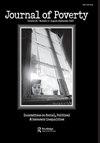努力工作还是几乎不工作?加拿大的贫困劳动者是谁?
IF 0.8
Q3 SOCIAL WORK
引用次数: 1
摘要
摘要加拿大的工作贫困一直笼罩在神秘和误解之中,因为研究和政策制定很少关注这一领域。我们利用加拿大收入调查的数据对加拿大的工作贫困进行了分析,并进行了二项逻辑回归,以讨论工作贫困的总体状况和工作贫困的决定因素。我们发现,在职穷人的中学后教育率很高,而且全职工作。此外,作为移民、单收入者(例如,单身个人、单亲家庭、单收入家庭)和自营职业者是工作贫困的决定因素。本文章由计算机程序翻译,如有差异,请以英文原文为准。
Working Hard or Hardly Working? Who are Canada’s Working Poor?
ABSTRACT Working poverty in Canada is shrouded in mystery and misconception due to the little attention given to this area in research and policy-making. We performed an analysis of working poverty in Canada by using data from the Canadian Income Survey and conducted a binomial logistic regression to discuss the general profile of the working poor and the determinants of working poverty. We found that the working poor have high rates of post-secondary education and worked full-time hours. Moreover, being an immigrant, a single-earner (e.g., unattached individual, lone-parent family, single-earning household), and being self-employed were determinants of working poverty.
求助全文
通过发布文献求助,成功后即可免费获取论文全文。
去求助
来源期刊

Journal of Poverty
SOCIAL WORK-
CiteScore
2.60
自引率
10.00%
发文量
26
期刊介绍:
The Journal of Poverty is the first refereed journal to recognize the inequalities in our social, political, and economic structures, presenting progressing strategies that expand society"s increasingly narrow notions of poverty and inequality. The journal"s broad understanding of poverty—more inclusive than the traditional view—keeps the focus on people"s need for education, employment, safe and affordable housing, nutrition, and adequate medical care, and on interventions that range from direct practice to community organization to social policy analysis. The journal"s articles will increase your knowledge and awareness of oppressive forces such as racism, sexism, classism, and homophobia that contribute to the maintenance of poverty and inequality.
 求助内容:
求助内容: 应助结果提醒方式:
应助结果提醒方式:


